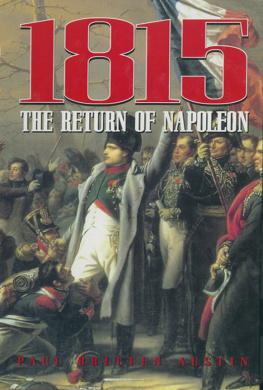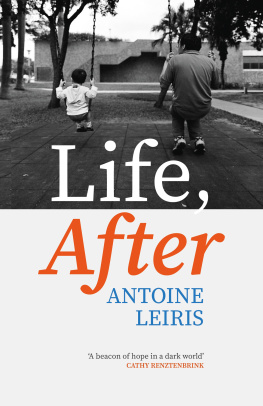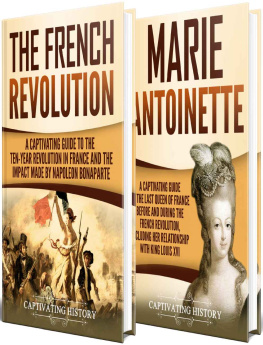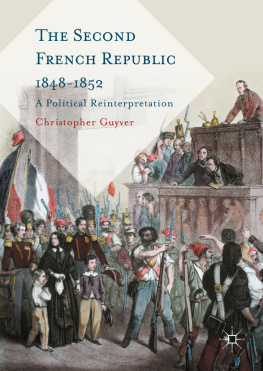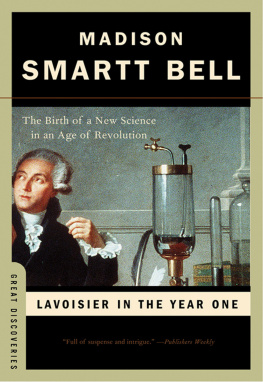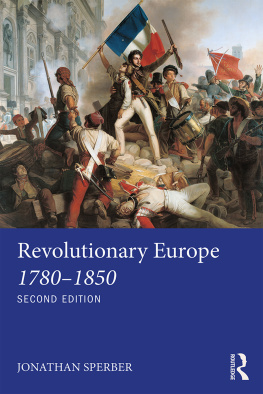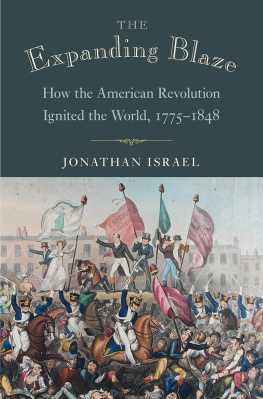FROM JACOBIN TO LIBERAL
FROM JACOBIN TO LIBERAL
MARC-ANTOINE JULLIEN, 1 7 7 5 1 8 4 8
Edited and Translated by R. R. Palmer
PRINCETON UNIVERSITY PRESS
PRINCETON, NEW JERSEY
COPYRIGHT1993 BY PRINCETON UNIVERSITY PRESS
PUBLISHED BY PRINCETON UNIVERSITY PRESS, 41 WILLIAM STREET,
PRINCETON, NEW JERSEY 08540
IN THE UNITED KINGDOM: PRINCETON UNIVERSITY PRESS, CHICHESTER, WEST SUSSEX
ALL RIGHTS RESERVED
JULLIEN, MARC-ANTOINE, 17751848.
[SELECTIONS, ENGLISH. 1993]
FROM JACOBIN TO LIBERAL: MARC-ANTOINE JULLIEN, 17751848 / EDITED AND TRANSLATED BY ROBERT R. PALMER.
P. CM.
A SELECTION OF WRITINGS BY MARC-ANTOINE JULLIEN
TRANSLATED FROM THE FRENCH.
INCLUDES BIBLIOGRAPHICAL REFERENCES AND INDEX.
eISBN 1-4008-0606-2
1. JULLIEN, MARC-ANTOINE, 17751848. 2. REVOLUTIONARIES FRANCEBIOGRAPHY. 3. AUTHORS, FRENCH19TH CENTURYBIOGRAPHY. 4. FRANCEHISTORYREVOLUTION, 17891799SOURCES. 5. FRANCEINDUSTRYHISTORY19TH CENTURYSOURCES. 6. LIBERALISM FRANCEHISTORY19TH CENTURYSOURCES. I. PALMER, R. R. (ROBERT
eISBN: 978-1-400-82101-3
R0
PREFACE
T HIS IS A BOOK of selected translations, although about a third of it is of my own writing. The person translated is Marc-Antoine Jullien, whose life in France coincided with the whole era of revolution in Europe and the Americas from 1775 to 1848. He may be taken as typical of many in France who had their hopes raised and dashed by so many rapid changes.
Born in the year when armed rebellion against Britain began in America, he witnessed the fall of the Bastille as a schoolboy in Paris, joined the Jacobin club, took part in the Reign of Terror, advocated democracy, put his hopes in Napoleon Bonaparte, turned against him, welcomed his return from Elba, became an outspoken liberal under the restored Bourbons, rejoiced in the revolution of 1830, had doubts about the July monarchy, welcomed the revolution of 1848, and died a few weeks before the election of Louis-Napoleon Bonaparte as president of the Second Republic.
Beyond France he was aware of revolutionary movements of similar purport on both sides of the Atlantic; he worked for revolution in Italy in 1797, admired the United States as a new creation, and favored the Latin American revolutions against Spain. In addition, he became a writer of some importance on education, and an alert observer of the contemporaneous Industrial Revolution. The schoolboy of 1789 lived to be excited by steamships and railroads. He also became a foreign member of the American Philosophical Society.
His writings on these subjects were abundant. They consist of books, pamphlets, reports, letters, book reviews, magazine articles, poems, and private notes and memoranda. Hence the excerpts selected here for translation are only a small fraction of the whole. In the present volume they are supplemented in the first chapter by letters from his mother in the early years of the French Revolution, and in the ninth chapter by articles by his collaborators in the Revue Encyclopdique, of which he was editor in the 1820s.
We have here a career that may shed light on the meaning of Jacobinism, liberalism, and the bourgeois revolution. Readers can judge these elusive matters for themselves. Marc-Antoine Jullien was certainly a bourgeois in the sense of the word current in his own time. He went through many twists and turns, adapting to many political systems, yet always with a preference for what he would call the principles of 1789, a dislike of their adversaries, and a hope that constitutional and representative government, with assurance for human rights, would ultimately prevail.
Jullien clearly enjoyed writing, and indeed his mother tells us, in one of her letters to him, that when he was a boy she had often wished that he would go to bed earlier, and not sit up so late at his desk with his candle still lighted. His written style is easy to translate, but is rather verbose and often repetitious, and occasionally marked by unusually long but well-constructed sentences, and by a habit of using words in pairs, such as two adjectives or two verbs where one would suffice. He often put words in italics or small capitals, duly reproduced in the present translations. Though long-winded, his style could be forceful and emphatic.
None of Julliens work has ever been translated. All the materials presented here are in print. Collections of papers exist in Paris and Moscow, as explained in the appended references, but I have felt no need of them for the present purpose, nor any inclination to travel to see them under my present circumstances, including age.
R.R.P.
Princeton, N.J.
May, 1993
FROM JACOBIN TO LIBERAL
ONE
A BOY AND HIS PARENTS IN THE FRENCH REVOLUTION
M ARC-ANTOINE JULLIEN, as a young boy, lived comfortably with his family in a small town in southern France, at Romans near the Rhne River, in the old province of Dauphiny in what would be the department of the Drme in and after the Revolution. He had one younger brother, a mother who was well educated and articulate, and a father who had the leisure to think and talk about recent books and public matters, since he had no business or profession to consume his time. They enjoyed an annual income of about 5,000 livres from their property, which consisted partly of small pieces of rural land from which they shared the income with their tenants, and partly of income, or rentes, from funds that they had placed with others. They had a house in town and a home in the country, and kept a servant. Their property was inherited. Marc-Antoines mothers father had been a merchant near Paris, and his fathers father a country surgeon in a village near Romans, a surgeon at that time needing no medical degree and having only a modest social status. The Julliens were very middle class, well above skilled artisans and wage workers, and with the kind of education and manners that let them occasionally have amicable contact with more aristocratic persons. Marc-Antoines father had once been a tutor in the house of a duchess, and was acquainted with the Abb de Mably, who though a philosophe was also a minor cleric and a noble. The Julliens were Catholic in background, but more inclined to natural religion in their actual feelings. They had read Rousseau as well as others, and were, withal, products of the Enlightenment.
When Marc-Antoine was ten years old his parents decided to send him to school in Paris, that is, to a college, which was the word for a place where boys from about ten to sixteen or eighteen received what we would call a secondary education. He would go to Navarre College, one of the colleges in the faculty of arts of the University of Paris. Most students lived within the college walls, but some lived in nearby boarding houses, and some with relatives in the city to whom parents in the provinces entrusted their children. For Marc-Antoine these were thought to be undesirable arrangements. His father would accompany him to the big city. Father and son took lodgings in the Latin Quarter, next to the newly built church of Sainte-Genevive, now the Panthon, and within a short walk of Navarre College and all other establishments in the ancient university. Jullien pre busied himself with developing his literary and other acquaintance in the city, which later proved useful to himand to Mme Jullienduring the Revolution. Mme Jullien meanwhile, in 1785, remained at home in Dauphiny with their younger son and a domestic servant.
She felt her isolation, and wrote a good many letters to both her son and her husband. She expected frequent letters from Marc-Antoine. He dutifully wrote a great many, which have not been preserved, but to which his mother often refers. In her letters to him she shows the concern for feeling and sensibility, the unblushing insistence on virtue, and the preoccupation with self-improvement that it was the fashion for both men and women to declare openly. We can see in her also a rather overwhelming and possessive mother, freely giving salutary advice, with a touch of self-pity and a need to hear a word of appreciation for her efforts.



